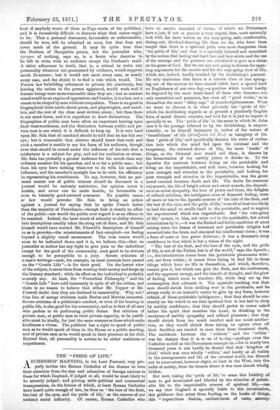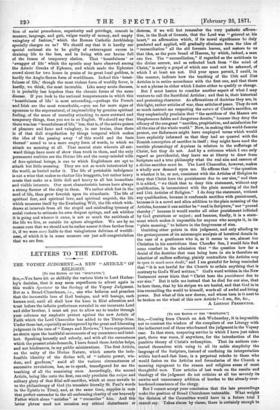THE " PRIDE OF LIFE."
ARCHBISHOP MANNING, in his Lent Pastoral, very pro- perly invites the Roman Catholics of his diocese to turn their attention from the sins and calamities of foreign nations to those for which England, if judged at all, would be most likely to be severely judged ; and putting aside political and commercial transgressions, on the former of which, at least Roman Catholics have heard quite enough of late, he fixes on ' the lust of the flesh, the lust of the eyes, and the pride of life,' as the centres of our nation's social infirmity. Of course, Roman Catholics who
have an ascetic standard of virtue, of which we Protestants have a just, if not at present a very urgent, fear, must naturally look with far more horror on the easy-going, safe, comfortable, dining-out, dividend-drawing life than we do, who have been taught that there is a spiritual pride even more dangerous than 'the pride of life,' and that it is specially fostered and nourished by the notion that fasting and hard fare and hair-shirts and the use of the scourge and the penance are calculated to give us a claim on the grace of God. But we are not now going to discuss the oppo- sing arguments for the ascetic and for the easy-going view of life, which are, indeed, hardly touched by the Archbishop's pastoral. He only maintains that there is a certain class of sins spring- ing out of the sources we have named which have a special hold on Englishmen of our own day,—a position which would hardly be disputed by the most strait-laced of those who denounce not only austerities and penances, but even all " good works," as in themselves the mere "filthy rags" of pseudo-righteousness. What we want to discuss is in what precisely the ' pride of life ' which the Archbishop regards as at present a peculiarly English form of moral disease consists, and how far it is just to impute it specially to us. The ' pride of life' in the sense in which St. John uses it in the passage referred to by the Archbishop, is unques- tionably, as he himself interprets it, rather of the nature of boastfulness' of life (cautonicc roe )3iou) or vaiuglory of life than pride of life,' and specifically denotes the state of exalta- tion into which the mind fed upon the external and the temporary, the outward shows of life, the mere ' husks' of things, as the Oriental seer would call them, is thrown by the fermentation of the earthly juices it drinks in. To the Apostles the contrast between living on the perishable and living on the imperishable, and still more, between looking for your strength and stimulus to the perishable, and looking for your strength and stimulus to the imperishable, was the great moral contrast between death and life. The desire for sensuous enjoyment, the life of bright colour and sweet sounds, the depend- ence on social sympathy, the love of praise and fame, the delights of refined criticism, the indulgence even of domestic feeling, were all more or less to the Apostle sources of ' the lust of the flesh, and the lust of the eyes, and the pride of life,' were all at least too likely to lead the mind to cradle itself in the perishable, and to neglect the supernatural which was imperishable. But the vain-glory of life' meant, to him, not mere rest in the perishable, but actual intoxication by it ;—it was the flushed and hectic condition of mind arising when the fumes of transient and perishable delights had mounted into the brain and obscured the intellectual vision ; it was . a form of more or less grave delirium ; it was a dreamer's crazy confidence in that which is but a vision of the night.
"The lust of the flesh, and the lust of the eyes, and the pride of life, is not of the Father, but is of the world," says the Apostle ; i.e., the intoxication comes from the perishable phenomena with- out, not from within ; it comes from trying to find life in those things which have no life in themselves, and which, therefore, cannot give it, but which can give the flush, and the restlessness, and the apparent energy, and the tumult of thought, and the glow of feeling, which seem to simulate life, while they set up the consumption that exhausts it. The apostolic teaching was that men should shrink from striking root in the perishable, and be always ready at an instant's notice to give up any form, however refined, of these perishable indulgences ; that they should be con- stantly on the watch to see that spiritual fear is not laid to sleep by earthly confidence ; that they should prefer to cower naked before the spirit that searches the heart, to drinking in the anodynes of earthly sympathy and refined pleasures ; that they should shrink from too much comfort and too much satisfac- tion, as they would shrink from taking an opiate when all their faculties are needed to save them from imminent death. The antithesis between the ' without' and the ' within' was far sharper than it is to us of to-day,—perhaps even the Catholics as well as the Protestants amongst us,—for in nearly two thousand years it can hardly be denied that that ' kingdom of God,' which was once wholly ' within,' and hardly at all visible in the arrangements and life of the external world, has filtered out to some extent, however slight, at least in the West, into the order of society, from the breasts where it was once almost wholly hidden.
But now, taking the ' pride of life.' to mean this liability of man to get intoxicated and blinded by the stimulus of perish-
able life to the imperishable sources of spiritual life,—can we say that England is specially liable to this intoxication, this giddiness that arises from feeding on the husks of things, this " supercilious disdain, exclusiveness of caste, assump- tion of social precedence, superiority and privilege, conceit in manner, language, and gait, vulgar vanity of money, and empty vainglory of fashion," which the Roman Catholic Archbishop specially charges on us? We should say that it is hardly our special national sin to be guilty of extravagant excess in draining life to the lees, and in living with our brains full of the fumes of temporary elation. That ' boastfulness' or 'swagger of life' which the apostle may have observed among the Asiatic Greeks of Ephesus, and which made the Ephesian crowd shout for two hours in praise of its great local goddess, is hardly the Anglo-Saxon form of worldliness. Indeed this boast- fulness of life,' though the most violent form of worldly fever, is hardly, we think, the most incurable. Like many acute diseases, it is probably less hopeless than the chronic forms of the same disease. If you look to the national temperaments in which this boastfulness of life' is most astounding,—perhaps the French and Irish are the most remarkable,—you see far more signs of openness to the supernatural, of impressibility by genuine spiritual feeling, of the sense of unreality attaching to mere outward and temporary things, than you see in us English. We should say that there was less " boastfulness of life," less, that is, of the active poison of pleasure and fame and vainglory, in our brains, than there is of that dull stupefaction by things temporal which makes the idea of the passing away ' of this world and the lusts thereof ' sound to us a mere empty form of words, to which we attach no meaning at all. That mental state wherein all out- ward things have more of show than truth in them, and the only permanent realities are the Divine life and the many-minded wills of free spiritual beings, is one to which Englishmen are apt to attach but little meaning. They are not so much intoxicated by the world, as buried under it. The life of perishable indulgence is not a wine that makes us chatter like braggarts, but rather heavy meats that make us a little dull and heavy to all but immediate and visible interests. Our most characteristic heroes have always a strong flavour of the clay in them. We rather stick fast in the mud of life, than grow feverish upon its stimulants. The life of spiritual fear, and spiritual love, and spiritual anguish, the life which measures itself by the Everlasting Will, the life which with- draws at intervals from all the stupid and misleading tyranny of social custom to estimate its own deepest springs, and ask whither it is going and whence it came, is not so much the antithesis of the life we live, as outside its sphere altogether. We are by no means sure that we should not be rather nearer it than farther from it, if we were more liable to that vainglorious delirium of worldli- ness, of which it is in some measure our just self-congratulation that we are free.



































 Previous page
Previous page